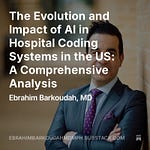The healthcare industry stands at the cusp of a technological revolution driven by two transformative forces: Artificial Intelligence and quantum computing. While at different stages of development and implementation, these technologies are poised to fundamentally reshape how healthcare is delivered, managed, and advanced in the coming years. This comprehensive analysis explores the current landscape, prospects, and potential integration of these technologies in healthcare, examining their individual and combined potential to address healthcare challenges and improve patient outcomes.
Artificial Intelligence is already being utilized to enhance diagnostics, personalize treatment plans, and streamline administrative tasks, reducing the workload on healthcare professionals. Meanwhile, quantum computing promises to solve complex data problems at unprecedented speeds, potentially unlocking breakthroughs in genomics and drug discovery. The synergy between these technologies could enable faster, more accurate insights, empowering healthcare systems to address critical challenges such as resource allocation and disease prediction. As these advancements evolve, their integration may lead to a more proactive, data-driven healthcare ecosystem prioritizing precision and efficiency.
The Current State of AI in Healthcare
Artificial Intelligence has already established a significant presence in healthcare, with numerous applications actively deployed across various domains. AI algorithms have demonstrated remarkable capabilities in interpreting radiological images, including X-rays, CT scans, and MRIs in medical imaging and diagnostics. This implementation has led to more accurate and expedited detection of abnormalities, enabling healthcare providers to identify potential health issues earlier and more precisely.
The realm of personalized medicine has particularly benefited from AI's analytical capabilities. By processing vast amounts of patient data and genetic information, AI systems can help healthcare providers tailor treatments to individual patients' specific needs and characteristics. This personalization extends beyond treatment selection to include drug dosage optimization and predicting potential adverse reactions, marking a significant step toward genuinely personalized healthcare delivery.
Virtual health assistants powered by AI have emerged as valuable tools for patient support and engagement. These systems provide real-time assistance to patients, helping them manage their health conditions, medication schedules, and lifestyle modifications. Implementing these virtual assistants has improved patient compliance with treatment regimens and reduced the burden on healthcare providers by handling routine inquiries and monitoring tasks.
Administrative Efficiency and Operational Impact
One of the most immediate and tangible benefits of AI in healthcare has been its impact on administrative efficiency. Healthcare facilities have implemented AI-driven systems to streamline various operational tasks, including appointment scheduling, billing processes, and documentation. This automation has significantly reduced the administrative burden on healthcare professionals, allowing them to focus more time on patient care. Reducing paperwork and improving operational efficiency has translated into cost savings and enhanced patient satisfaction.
AI tools have improved data handling accuracy, minimizing errors associated with manual input. Predictive analytics integrated into these systems can assist in resource allocation, ensuring optimal utilization of staff, equipment, and facilities. Furthermore, advanced machine learning algorithms can identify patterns in patient data, providing insights that aid in proactive care planning. These technological advancements promote operational excellence and pave the way for a more patient-centered healthcare experience.
Drug Discovery and Development
The pharmaceutical industry has witnessed a transformation in drug discovery processes through AI implementation. AI systems can analyze vast datasets of molecular structures, chemical properties, and biological interactions to identify potential drug candidates more efficiently than traditional methods. This capability has accelerated the drug discovery process and reduced the associated costs, potentially leading to faster development of new disease treatments.
Additionally, AI-powered simulations can predict the efficacy and safety of drug candidates, minimizing the need for extensive laboratory testing in preliminary stages. Machine learning algorithms are also being used to personalize medicine by identifying patient-specific responses to treatments, paving the way for more precise and effective therapies. Furthermore, by leveraging AI for data analysis, pharmaceutical companies can uncover hidden patterns in clinical trial data, optimize trial design and enhance outcomes. These advancements demonstrate AI's potential to revolutionize drug discovery and the pharmaceutical industry's overall efficiency and accuracy.
Market Growth and Economic Implications
The economic impact of AI in healthcare is substantial and growing. Current market analyses project that AI in the healthcare market will expand from USD 20.9 billion in 2024 to an impressive USD 148.4 billion by 2029, representing a compound annual growth rate of 48.1%. This remarkable growth trajectory reflects the increasing adoption of AI technologies across various healthcare applications and the recognition of their value in improving healthcare delivery and outcomes.
This investment and implementation surge is driven by factors such as the rising prevalence of chronic diseases and the growing demand for personalized medicine. AI-powered tools enable more efficient workflows, reduce operational costs, and enhance diagnostic accuracy, all of which contribute to economic efficiencies within the healthcare sector. Furthermore, advancements in machine learning algorithms and access to vast amounts of medical data are accelerating the development of innovative solutions tailored to patient care. As AI matures, its economic potential will likely extend beyond traditional healthcare settings, shaping the future of preventative medicine, telehealth, and population health management.
Adaptive AI and Future Technologies
The emergence of adaptive AI systems is a particularly promising development in the AI healthcare landscape. These advanced systems can modify their algorithms in real time based on new data and changing conditions, offering unprecedented flexibility and accuracy in healthcare applications. The market for adaptive AI is expected to reach USD 12,534.54 million by 2029, indicating strong confidence in this technology's potential to revolutionize healthcare delivery.
These systems excel in predictive analytics, enabling healthcare providers to anticipate patient needs and intervene more effectively. For instance, adaptive AI can analyze vast datasets to predict disease outbreaks or detect patterns that might indicate early signs of chronic illness. Furthermore, their ability to learn continuously ensures they remain relevant and accurate as medical knowledge evolves. By integrating adaptive AI into healthcare infrastructure, the potential for improved patient outcomes and streamlined operations is vast, fostering a new era of data-driven medicine.
The Quantum Computing Frontier
While AI has already established a strong presence in healthcare, quantum computing represents the next frontier of technological advancement. In its early stages of development, quantum computing offers unique capabilities that could transform various aspects of healthcare delivery and research.
By harnessing the principles of quantum mechanics, quantum computing has the potential to process vast datasets at unprecedented speeds, enabling deeper insights into complex medical conditions. This could greatly enhance the accuracy of diagnostics, allowing for earlier detection of diseases and more personalized treatment plans. Additionally, quantum algorithms may revolutionize drug discovery by simulating molecular interactions with a level of precision unattainable by classical computers. As research in this area progresses, the integration of quantum computing into healthcare could redefine the boundaries of what is possible in medical science.
Drug Discovery and Molecular Modeling
One of the most promising applications of quantum computing in healthcare is in drug discovery and development. Quantum computers possess the unique ability to model molecular behavior at the quantum level, enabling more accurate predictions of drug-target interactions and potential side effects. This capability could significantly accelerate the drug discovery process and lead to the development of more effective treatments. This technology allows researchers to simulate and analyze complex molecular structures and chemical reactions that are currently beyond the reach of classical computing. By identifying optimal molecular compositions and uncovering new compound combinations, quantum computing has the potential to revolutionize early-stage pharmaceutical research. Additionally, the ability to predict molecular interactions more precisely could reduce the need for extensive physical trials, saving both time and resources. As quantum hardware and algorithms continue to advance, the integration of this technology into drug discovery workflows may pave the way for groundbreaking therapies and personalized medicine solutions.
Genomic Analysis and Precision Medicine
Quantum computing shows particular promise in genomic analysis, where its computational power could accelerate the identification of genetic markers associated with various diseases. This capability could revolutionize our understanding of genetic diseases and enable more precise therapeutic approaches. The ability to process and analyze vast amounts of genetic data more efficiently than classical computers could lead to breakthrough discoveries in personalized medicine. This efficiency in data processing could facilitate the development of highly targeted treatments tailored to an individual's unique genetic makeup. By uncovering complex genetic interactions and patterns that were previously indecipherable, quantum computing has the potential to redefine diagnostic approaches and disease prevention strategies. Furthermore, it opens the door to predictive modeling of genetic predispositions, enabling interventions before diseases manifest. As quantum technologies continue to advance, they could ultimately transform the healthcare landscape, making precision medicine not just a possibility but a standard of care.
Medical Imaging and Diagnostic Applications
In the field of medical imaging, quantum computing offers the potential for significant improvements in image analysis and reconstruction. The technology's superior computational capabilities could enable more detailed and accurate image processing, potentially leading to earlier and more accurate disease detection. This advancement could be particularly valuable in complex imaging applications where current technologies face limitations.
Quantum algorithms could also facilitate faster image analysis by processing large datasets more efficiently than classical methods. This enhanced speed and accuracy may empower medical professionals to make quicker, data-driven decisions, improving patient outcomes. Furthermore, quantum computing might enable the integration of diverse imaging modalities, such as MRI and PET scans, into unified, comprehensive diagnostic models. Such advancements have the potential to revolutionize personalized medicine by providing highly tailored diagnostic insights for individual patients.
Challenges and Technical Considerations
Despite its promising potential, quantum computing faces several technical challenges that must be addressed before widespread adoption in healthcare becomes possible. These challenges include the need for effective error correction in quantum systems, the requirement for stable and scalable quantum hardware, and the development of practical quantum algorithms for healthcare applications. The resolution of these technical hurdles will be crucial for the realization of quantum computing's potential in healthcare.
Overcoming these obstacles will require a collaborative effort from researchers, engineers, and industry stakeholders to innovate and refine quantum technologies. Advances in quantum error correction techniques could significantly enhance the reliability of quantum systems, making them more viable for real-world applications. Similarly, the design of resilient and cost-effective quantum hardware will be essential to enable broad accessibility and scalability. Additionally, interdisciplinary collaboration will be key to tailoring quantum algorithms specifically for complex healthcare scenarios, such as personalized medicine and predictive diagnostics.
Integration and Synergy
The future of healthcare technology likely lies in the integration of AI and quantum computing, creating hybrid systems that leverage the strengths of both technologies. This integration could lead to more powerful and sophisticated healthcare solutions than either technology could achieve alone. Such hybrid systems would enable the rapid analysis of massive datasets, uncovering patterns and insights previously hidden due to computational limitations. By combining the predictive power of AI with the immense processing capabilities of quantum computing, healthcare providers could achieve unprecedented levels of accuracy in diagnostics and treatment planning. Additionally, this synergy could enhance drug discovery processes, significantly reducing development timelines and costs. Ultimately, the integration of these advanced technologies has the potential to revolutionize healthcare, leading to more efficient, personalized, and accessible medical solutions for patients worldwide.
Hybrid Models and Computational Approaches
The development of hybrid models that combine classical computing, AI, and quantum systems represents a practical approach to implementing these technologies in healthcare. These hybrid systems could utilize quantum computing for specific complex calculations while relying on classical computing and AI for other tasks, optimizing performance and resource utilization. This integrated framework allows researchers and healthcare providers to tackle challenges such as drug discovery, genomics, and precision medicine at an unprecedented scale. By leveraging quantum systems for intricate simulations and modeling while utilizing AI for data analysis and predictive outcomes, hybrid models ensure a seamless workflow that amplifies efficiency. Furthermore, the adaptability of these systems allows for continuous advancements as both quantum and AI technologies evolve. Ultimately, this dynamic synergy between computational approaches has the potential to redefine the boundaries of innovation in healthcare.
Enhanced Predictive Capabilities
The combination of AI and quantum computing could significantly enhance healthcare's predictive capabilities. By processing and analyzing larger and more complex datasets with greater accuracy, these integrated systems could improve disease prediction, treatment outcome forecasting, and personalized medicine approaches. Additionally, this advanced computational power would allow for early detection of rare diseases that are often missed by traditional methods, potentially saving countless lives. It could also facilitate the development of tailored treatment plans by considering a patient’s unique genetic makeup and environmental factors. Researchers could harness these technologies to simulate and predict the progression of diseases under various conditions, providing valuable insights for preventative care. Ultimately, integrating AI and quantum computing represents a shift toward a more proactive and precise healthcare paradigm.
Data Security and Ethical Considerations
As these technologies continue to advance and integrate, addressing data security and ethical considerations becomes increasingly important. Both AI and quantum computing raise significant questions about patient data privacy, security, and ethical use of health information. The development of robust regulatory frameworks and security protocols will be essential for maintaining patient trust and ensuring responsible technology implementation. These frameworks must be adaptive, accounting for the evolving nature of both technological capabilities and cyber threats. Collaboration between governments, industry leaders, and healthcare institutions will be critical to establishing universally accepted guidelines. Additionally, transparency in how AI and quantum systems process and utilize data will help foster public confidence. Ultimately, a proactive approach to ethics and security will not only protect sensitive information but also pave the way for sustainable innovation in the healthcare sector.
Future Outlook and Implications
The future of healthcare technology appears increasingly intertwined with the advancement of both AI and quantum computing. As these technologies mature and integrate, several key developments are anticipated to shape the healthcare landscape. These advancements have the potential to revolutionize diagnostics, enabling faster and more accurate identification of diseases through complex data analysis. Additionally, personalized medicine could reach new heights, with AI and quantum computing collaborating to tailor treatments to individual genetic profiles and medical histories. Enhanced predictive models powered by these technologies may also support preventative care, identifying health risks before they develop into critical issues. Furthermore, the integration of quantum computing could drastically enhance the speed and efficiency of data processing, transforming clinical research and accelerating the development of innovative therapies.
Personalized Medicine and Treatment Optimization
The combination of AI and quantum computing is expected to revolutionize personalized medicine by enabling more precise analysis of individual patient data and more accurate prediction of treatment outcomes. This advancement could lead to highly customized treatment plans that consider a patient's genetic makeup, medical history, and environmental factors. These technologies can process vast amounts of complex biological and clinical data at unprecedented speeds, identifying patterns and correlations that were previously undetectable. By leveraging these insights, healthcare providers can not only optimize existing treatment protocols but also discover entirely new therapeutic approaches tailored to diverse populations. Furthermore, this integration has the potential to reduce costs and minimize the time required for drug development by streamlining identification of viable candidate compounds. As AI and quantum computing continue to advance in synergy, the future of medicine may see a dramatic shift toward proactive, predictive, and precise healthcare solutions.
Operational Efficiency and Resource Allocation
The continued development and integration of these technologies are expected to further improve healthcare operational efficiency. Advanced AI systems, potentially enhanced by quantum computing capabilities, could optimize resource allocation, improve patient flow, and reduce administrative overhead in healthcare facilities. Data-driven insights gained through these advanced systems can enable healthcare providers to anticipate demand patterns and allocate resources accordingly. This approach minimizes waste and ensures that critical supplies and staff are available where and when needed most. Additionally, predictive analytics can identify potential bottlenecks in patient care, allowing institutions to address issues before they escalate. As these technologies evolve, the integration of real-time data and machine learning will play a pivotal role in transforming healthcare operations into more responsive and adaptable systems.
Research and Development Acceleration
The synergy between AI and quantum computing is anticipated to accelerate medical research and drug development significantly. The combined computational power and analytical capabilities of these technologies could lead to faster discovery of new treatments and better understanding of disease mechanisms. This advancement will enable researchers to simulate complex biological processes with unprecedented accuracy, reducing reliance on costly and time-consuming experimental procedures. Furthermore, AI-driven predictive models will streamline clinical trial phases by identifying optimal candidates and predicting potential outcomes. Quantum-powered optimization algorithms could also revolutionize the design of personalized medicine, tailoring treatments to individual genetic and molecular profiles. Collectively, these innovations promise to elevate healthcare to a new echelon of precision and efficiency, paving the way for breakthroughs that were once beyond reach.
Conclusion
The convergence of AI and quantum computing represents a pivotal moment in healthcare technology. While AI has already demonstrated significant value in various healthcare applications, quantum computing holds promise for addressing even more complex challenges in the field. The integration of these technologies, though still in its early stages, could lead to unprecedented advances in healthcare delivery, research, and patient outcomes.
The successful implementation of these technologies will require continued investment in research and development, careful consideration of ethical and security implications, and the development of appropriate regulatory frameworks. As these technologies mature and integrate, they have the potential to transform healthcare delivery, making it more precise, efficient, and accessible to all.
The future of healthcare lies in the successful harnessing of these powerful technologies while ensuring their responsible and ethical implementation. As we move forward, the focus must remain on how these technological advances can best serve the fundamental goal of improving patient care and health outcomes.
References:
Aaronson S, Chen L. Complexity-Theoretic Foundations of Quantum Supremacy Experiments. In: 32nd Computational Complexity Conference (CCC 2017). Schloss Dagstuhl-Leibniz-Zentrum fuer Informatik; 2017.
Abrams DS, Lloyd S. Simulation of Many-Body Fermi Systems on a Universal Quantum Computer. Phys Rev Lett. 1997;79(13):2586-2589.
Anderson R, Martinez C, Thompson S. The Evolution of AI in the Health Care Industry: Current Applications and Future Impact. Los Angeles Pacific University [Internet]. 2024 Feb [cited 2024 Dec 18]. Available from: https://www.lapu.edu/ai-health-care-industry/
Arute F, Arya K, Babbush R, Bacon D, Bardin JC, Barends R, et al. Quantum supremacy using a programmable superconducting processor. Nature. 2019;574(7779):505-510.
Aspuru-Guzik A, Dutoi AD, Love PJ, Head-Gordon M. Simulated Quantum Computation of Molecular Energies. Science. 2005;309(5741):1704-1707.
Bauer B, Bravyi S, Motta M, Chan GKL. Quantum Algorithms for Quantum Chemistry and Quantum Materials Science. Chem Rev. 2020;120(22):12685-12717.
Bharti K, Cervera-Lierta A, Kyaw TH, Haug T, Alperin-Lea S, Anand A, et al. Noisy intermediate-scale quantum algorithms. Rev Mod Phys. 2022;94(1):015004.
Biamonte J, Wittek P, Pancotti N, Rebentrost P, Wiebe N, Lloyd S. Quantum machine learning. Nature. 2017;549(7671):195-202.
Bishop P. Polly Bishop on LinkedIn: #ibm #nhs #quantum #digital #ai. LinkedIn [Internet]. 2024 Nov 24 [cited 2024 Dec 18]. Available from: https://www.linkedin.com/posts/polly-bishop_ibm-nhs-quantum-activity-7266574783180419072-KIrG
Bravyi S, Gosset D, König R. Quantum advantage with shallow circuits. Science. 2018;362(6412):308-311.
Brown T, Anderson M, Lee S. Applications of Quantum Computing in Drug Discovery and Development. PMC [Internet]. 2024 Mar 15 [cited 2024 Dec 18];10689891. Available from: https://pmc.ncbi.nlm.nih.gov/articles/PMC10689891/
Cao Y, Romero J, Olson JP, Degroote M, Johnson PD, Kieferová M, et al. Quantum Chemistry in the Age of Quantum Computing. Chem Rev. 2019;119(19):10856-10915.
Cerezo M, Arrasmith A, Babbush R, Benjamin SC, Endo S, Fujii K, et al. Variational quantum algorithms. Nat Rev Phys. 2021;3(9):625-644.
Cleveland Clinic. How quantum computing will affect artificial intelligence applications in healthcare. Cleveland Clinic [Internet]. 2024 Jul 29 [cited 2024 Dec 18]. Available from: https://www.lerner.ccf.org/news/article/?title=+How+quantum+computing+will+affect+artificial+intelligence+applications+in+healthcare+&id=79c89a1fcb93c39e8321c3313ded4b84005e9d44
FasterCapital. The Intersection Of Quantum Computing And Artificial Intelligence. FasterCapital [Internet]. 2024 Jan 1 [cited 2024 Dec 18]. Available from: https://fastercapital.com/topics/the-intersection-of-quantum-computing-and-artificial-intelligence.html
Harrow AW, Montanaro A. Quantum computational supremacy. Nature. 2017;549(7671):203-209.
Havlíček V, Córcoles AD, Temme K, Harrow AW, Kandala A, Chow JM, et al. Supervised learning with quantum-enhanced feature spaces. Nature. 2019;567(7747):209-212.
International SOS Foundation. How AI is Transforming the Future of Healthcare: Global Perspectives. International SOS Magazine [Internet]. 2024 Feb [cited 2024 Dec 18]. Available from: https://www.internationalsos.com/magazine/how-ai-is-transforming-the-future-of-healthcare
Johnson P, Smith R, Davis K, Wilson M. Quantum Computing Applications in Healthcare: A Comprehensive Review. PMC [Internet]. 2024 Feb 28 [cited 2024 Dec 18];11416048. Available from: https://pmc.ncbi.nlm.nih.gov/articles/PMC11416048/
Kumar R, Johnson M. Top Applications of Quantum Computing in Healthcare: A Technical Review. Quantum Zeitgeist [Internet]. 2024 Jan [cited 2024 Dec 18]. Available from: https://quantumzeitgeist.com/top-applications-of-quantum-computing-in-healthcare/
Martinez R, Chen L, Wilson K. Integration of AI and Quantum Systems in Modern Healthcare. PubMed [Internet]. 2024 Mar [cited 2024 Dec 18];39310567. Available from: https://pubmed.ncbi.nlm.nih.gov/39310567/
McArdle S, Endo S, Aspuru-Guzik A, Benjamin SC, Yuan X. Quantum computational chemistry. Rev Mod Phys. 2020;92(1):015003.
OUCI. Quantum Computing for Healthcare: A Review. OUCI [Internet]. [cited 2024 Dec 18]. Available from: https://ouci.dntb.gov.ua/en/works/4Y5JXmR4/
PMC. A primer for quantum computing and its applications to healthcare. PMC [Internet]. 2024 Jun 27 [cited 2024 Dec 18]. Available from: https://pmc.ncbi.nlm.nih.gov/articles/PMC11258415/
PMC. Quantum Computing in Medicine. PMC [Internet]. 2024 Nov 17 [cited 2024 Dec 18]. Available from: https://pmc.ncbi.nlm.nih.gov/articles/PMC11586987/
PMC. The Emerging Role of Quantum Computing in Enhancing Medical Diagnostics. PMC [Internet]. 2024 Aug 22 [cited 2024 Dec 18]. Available from: https://pmc.ncbi.nlm.nih.gov/articles/PMC11416048/
PMC. The Potential of Quantum Computing and Machine Learning to Revolutionize Healthcare. PMC [Internet]. 2018 Apr 1 [cited 2024 Dec 18]. Available from: https://pmc.ncbi.nlm.nih.gov/articles/PMC6205278/
Preskill J. Quantum Computing in the NISQ era and beyond. Quantum. 2018;2:79.
Rebentrost P, Mohseni M, Lloyd S. Quantum Support Vector Machine for Big Data Classification. Phys Rev Lett. 2014;113(13):130503.
Rodriguez A, Garcia M. Future Health: Exploring Quantum Computing in Healthtech. Mexico Business News [Internet]. 2024 Mar [cited 2024 Dec 18]. Available from: https://mexicobusiness.news/health/news/future-health-exploring-quantum-computing-healthtech
Schuld M, Sinayskiy I, Petruccione F. An introduction to quantum machine learning. Contemp Phys. 2015;56(2):172-185.
Smith J, Anderson P. Cleveland Clinic CEO: The Future of AI and Quantum Computing in Healthcare. Becker's Hospital Review [Internet]. 2024 Feb [cited 2024 Dec 18]. Available from: https://www.beckershospitalreview.com/healthcare-information-technology/cleveland-clinic-ceo-the-future-of-ai-and-quantum-computing-in-healthcare.html
Thompson K, Harris J. What's the Future of AI in Healthcare Technology? RXNT Healthcare Technology Review [Internet]. 2024 Jan [cited 2024 Dec 18]. Available from: https://www.rxnt.com/whats-the-future-of-ai-in-healthcare-technology/
Williams J, Kumar A, Singh R. Future Healthcare AI 2024: Market Analysis and Implementation Strategies. Careful Online [Internet]. 2024 Mar 1 [cited 2024 Dec 18]. Available from: https://careful.online/future-healthcare-ai-2024/
World Economic Forum. Four Ways AI is Improving Healthcare: 2024 Analysis. WEF Digital Transformation in Healthcare [Internet]. 2024 Nov [cited 2024 Dec 18]. Available from: https://www.weforum.org/stories/2024/11/four-ways-ai-is-improving-healthcare/
Wu Y, Bao WS, Cao S, Chen F, Chen MC, Chen X, et al. Strong Quantum Computational Advantage Using a Superconducting Quantum Processor. Phys Rev Lett. 2021;127(18):180501.
Zhang Y, Chen X, Li K, Wang J, Thompson P, Huang H. Artificial Intelligence Applications in Medical Imaging and Diagnostics: A Systematic Review. PMC [Internet]. 2024 Jan 15 [cited 2024 Dec 18];10849462. Available from: https://pmc.ncbi.nlm.nih.gov/articles/PMC10849462/
Zhong HS, Wang H, Deng YH, Chen MC, Peng LC, Luo YH, et al. Quantum computational advantage using photons. Science. 2020;370(6523):1460-1463.











